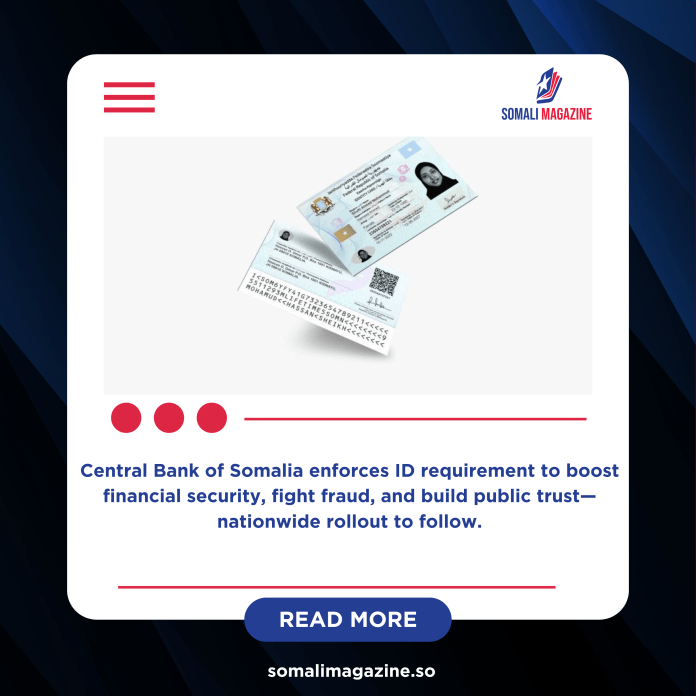Facebook Twitter (X) Instagram Somali Magazine - People's Magazine
Starting September 1, Somali citizens will need a national ID card to open new bank accounts in the Banadir region, according to a new directive by the Central Bank of Somalia. This policy, introduced in collaboration with the National Identification and Registration Authority (NIRA) and the Somali Bankers Association, applies to all commercial banks and licensed financial institutions operating in Mogadishu and surrounding districts. Authorities say the rule will later expand to the rest of the country.
The Central Bank said requiring a NIRA-issued ID is meant to create a unified identity system for all financial institutions. This move is expected to improve customer verification, reduce fraud, prevent money laundering, and build public trust in Somalia’s banking system.
This latest banking rule is part of a broader national plan to make national ID cards mandatory for accessing various government services. In June 2025, the Ministry of Transport and Civil Aviation began enforcing the ID requirement for issuing driver’s licenses, registering vehicles, and granting transport permits. These changes followed a directive from Prime Minister Hamza Abdi Barre in April, which required all federal agencies to adopt the national ID system. The Prime Minister said the new ID system is crucial for improving governance, national security, and rebuilding public trust.
The agency responsible for managing the national ID program is NIRA, created by federal law in 2023. NIRA is in charge of issuing biometric ID cards, protecting citizens’ personal data, and creating systems that allow different government departments to share information. So far, NIRA has launched ID registration platforms such as e-Aqoonsi and Hubiye in several federal states, although the rollout has been slower in rural areas.
Somalia lacked a proper national ID system for more than 30 years, ever since the central government collapsed in 1991. That changed in September 2023, when biometric ID cards were officially launched, with registration centers opened in Mogadishu, Galmudug, Hirshabelle, and Las Anod.
The new ID initiative is also part of Somalia’s commitment as a member of the East African Community (EAC), which encourages countries to develop digital identity systems that support regional cooperation and economic growth.
Leaders in Somalia have praised the national ID as a game-changer for the country. Prime Minister Barre sees it as a solution to problems in elections, governance, and economic inclusion. President Hassan Sheikh Mohamud has called it “the backbone of national security,” saying the lack of proper identification has made it harder to fight terrorism and provide public services.
However, not everyone agrees with the federal government’s approach. In June, Puntland’s regional government rejected the ID rollout, saying it threatens regional autonomy and the federal structure. Tensions increased when Puntland security forces arrested a journalist reporting on the issue, drawing criticism from media groups and federal officials. In response, the federal government emphasized that NIRA is the only body legally allowed to issue national IDs and warned that no other ID systems would be recognized.
There are also technical challenges. For example, on July 11, the Immigration and Citizenship Agency said that Somali passports still require older documents like birth certificates and police clearance because their systems haven’t yet been fully linked to NIRA’s database.
Although the new ID requirement currently applies only to new bank accounts in Banadir, the Central Bank is urging all citizens to register with NIRA. The government plans to make verified national ID cards necessary for accessing more services in the future, both in public institutions and the financial sector.

